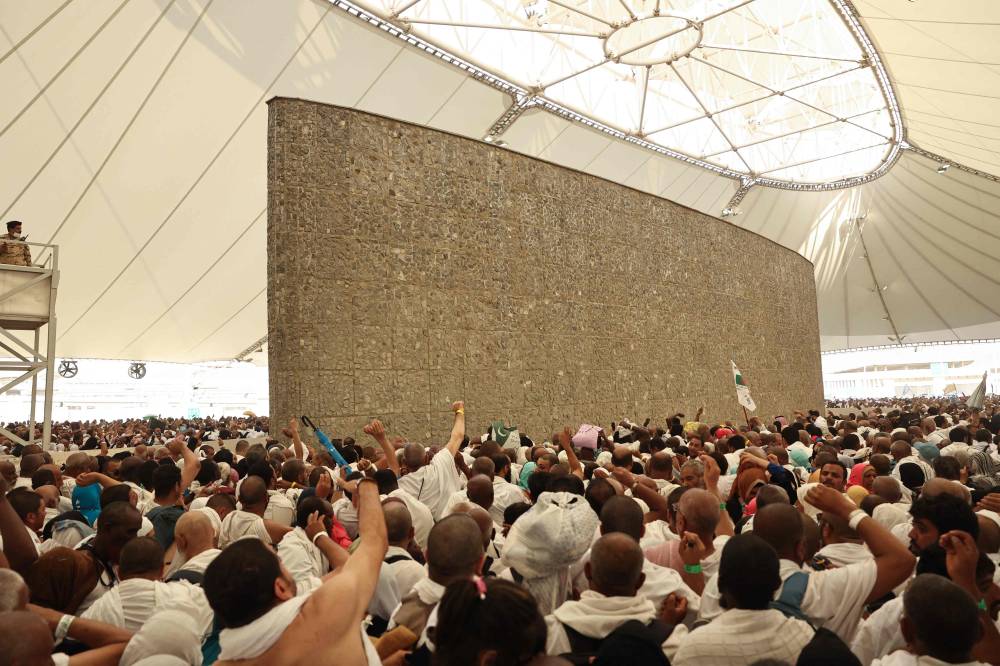Hajj pilgrims ‘stone the devil’ as Muslims mark Eid al-Adha

Muslim pilgrims perform the symbolic “stoning of the devil” ritual as part of the hajj pilgrimage in Mina, near Saudi Arabia’s holy city of Mecca, on June 16, 2024. Pilgrims perform the last major ritual of the hajj, the “stoning of the devil”, in western Saudi Arabia on June 16, as Muslims the world over celebrate the Eid al-Adha holiday. —photo by Fadel Senna/Agence France-Presse
MINA, SAUDI ARABIA — Pilgrims on Sunday performed the last major ritual of the hajj, the “stoning of the devil,” in western Saudi Arabia as Muslims around the globe celebrated the Eid al-Adha holiday.
As one of the world’s largest annual religious gatherings wound down, authorities from multiple countries said at least 22 people had died, many of them from “extreme heat,” highlighting the acute physical toll of the annual rites which in recent years have fallen during the oven-like Saudi summer.
Beginning at dawn, the 1.8 million Muslims undertaking the pilgrimage this year threw seven stones at each of three concrete walls symbolizing the devil in the Mina valley, located outside Islam’s holiest city of Mecca.
READ: Marcos’ Eid’l Adha message: Grow in wisdom and fortitude
The ritual commemorates Abraham’s stoning of the devil at the three spots where it is said Satan tried to dissuade him from obeying God’s order to sacrifice his son.
Worst hajj disaster
Multiple stampedes have occurred in Mina over the years, most recently in 2015 when up to 2,300 worshippers were killed in the worst hajj disaster.
The site has been revamped since then to streamline the movement of the large crowds.
Roads leading to the concrete walls were nevertheless packed on Sunday, with some pilgrims struggling under the morning sun.
Temperatures soared well above 40 degrees Celsius (104 degrees Fahrenheit) each day and on Saturday hit 46 degrees Celsius (114.8 degrees Fahrenheit) on Mount Arafat, where pilgrims performed hours of outdoor prayers.
Jordan’s foreign ministry said on Sunday that 14 Jordanian pilgrims had died “after suffering sun stroke due to the extreme heat wave,” and that 17 others were “missing.”
Iran reported the deaths of five pilgrims but did not specify the cause, while Senegal’s foreign ministry said that three others had died.
Saudi Arabia has not provided any information on fatalities.
During last year’s hajj at least 240 people—many from Indonesia—died, according to figures announced by various countries which also did not specify causes of death.
Taxing conditions
There were also more than 10,000 cases of heat-related illnesses, 10 percent of which were heatstroke, a health ministry spokesperson told Agence France-Presse (AFP).
Worshippers did their best to take the taxing conditions in stride, seizing what for many was a once-in-a-lifetime chance to pray at Islam’s holiest shrines.
One treatment center near Mount Arafat recorded 225 cases of heat stress and fatigue so far, the official Saudi Press Agency reported.
One of the five pillars of Islam, the hajj must be performed at least once by all Muslims with the means.
This year’s figure of 1.8 million pilgrims is similar to last year’s, and Saudi authorities said on Saturday that 1.6 million of them came from abroad.
These included 17,500 Syrians, according to Badreddine Mansour, director of a Saudi agency specializing in pilgrimages.
For Syrians living in government-controlled areas, hajj has long been out of reach but the reintegration of President Bashar Assad’s government into the Arab fold last year has enabled direct flights to the pilgrimage.
Sunday’s stoning ritual coincided with the Muslim holiday of Eid al-Adha, or the Feast of Sacrifice, which honors Abraham’s willingness to sacrifice his son before God offered a sheep instead. —Agence France-Presse














